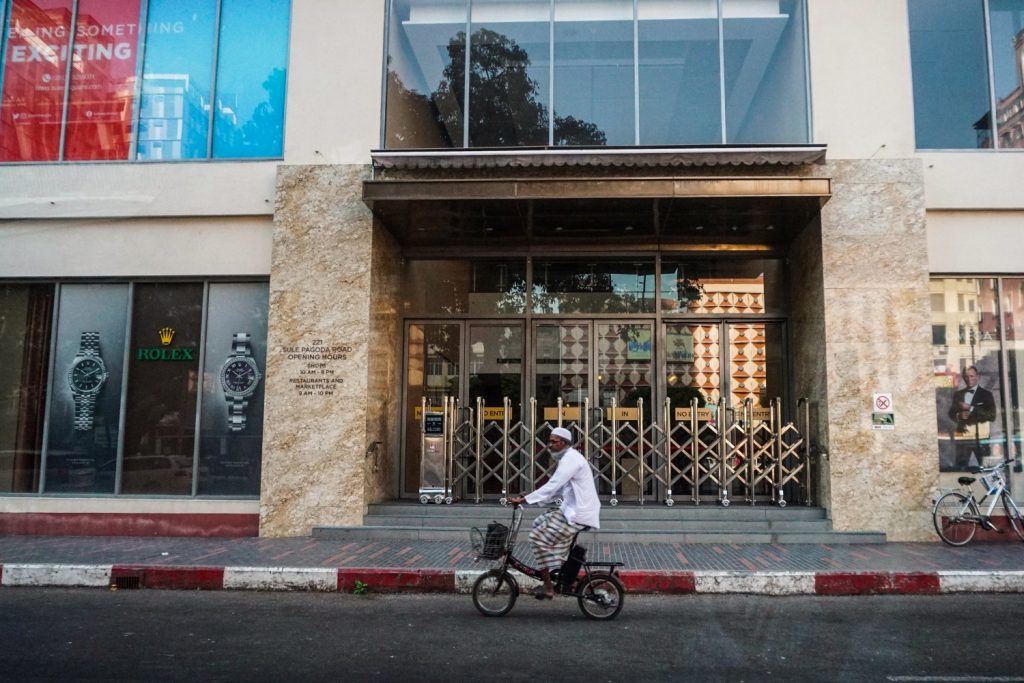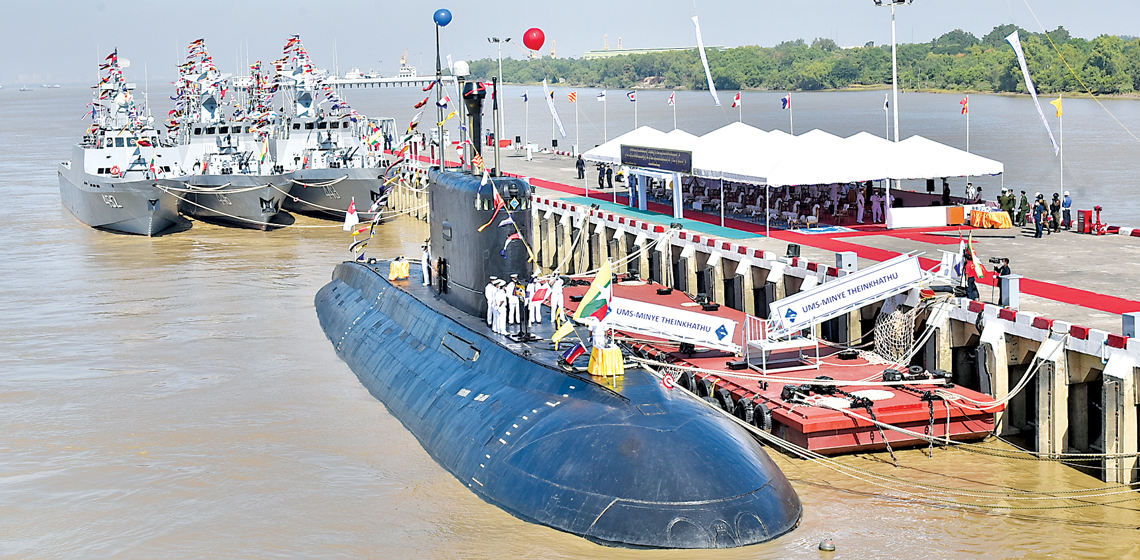The fallout from the February 1 coup has left the economy reeling, with far-reaching disruption to businesses and an inability to plan for the future. Frontier spoke to six business leaders on the steps they are taking to survive and what needs to happen for Myanmar to avoid economic calamity.
By FRONTIER
The economy has been pummelled by the February 1 coup and its aftermath, with some businesses shutting down, others operating at a fraction of their capacity and the export-earning garment industry losing 70 percent of its workers.
Six prominent businesspeople have spoken to Frontier about the plight of their industries, their concerns for their employees, and what the future might bring.
Dr Soe Tun
Chair of the Myanmar Automobile Manufacturers and Distributors Association
Most businesses have stopped, although some are still operating. The main problem has been the closure of banks, which has meant we can’t conduct transactions.
Now, the banks are planning to reopen and businesses are also trying to resume operations. Overall, however, the economy hasn’t returned to normal.
We are waiting to see if the situation becomes stable. We are doing our best to support our employees but if the time comes when we cannot help them, they will not have an income.
If all businesses have to stop, the big problem that I worry about is unemployment. Unless there is stability, the unemployment situation is likely to get worse, meaning people could go hungry.
U Aye Tun
CEO of car and petroleum products dealership Aung Thein Than
Our business is operating at about 20pc of its usual capacity. Car sales have stopped for a number of reasons, including a lack of orders from our customers. But financial transactions are also a problem because the entire banking system has come to a stop.
The situation with the banking sector is pretty bad. We cannot withdraw funds paid into accounts by customers, meaning we’re unable to pay our employees.
Widespread disruptions to the transport sector have had a severe effect on our logistics. Processing delays are affecting the documents we need to ship or import products and transport costs are also rising.
Another problem is that our employees dare not stay in cities. Those who come from other states and regions have returned to their home towns and villages. Only about one-third of our usual workforce remains in cities.
It’s not easy to keep our businesses going; some things are just beyond our control. We have about 400 employees in our business group. But when the economic situation is so disrupted that we can’t run our businesses, it’s difficult to continue providing jobs.
Businesses will shrink in the coming months. If the situation continues, we will have no choice other than to minimise our operations to save costs.
It is important that the economy returns to normal, so that all businesses can resume operations. But we don’t know for how long this situation will last. It’s closely related to politics.
Ko Thet Tin Win aka Ko Tayoke Lay
Managing director of Yangon bus operator Power Eleven Bus Line
Our company operates 250 buses that run on Yangon Bus Service lines 21, 39 and 41, and we started cutting back on our services a year ago because of COVID-19. We have tried to maintain our operations as much as possible, though, because if we stopped, passengers would have no transport and our employees would lose their jobs.
After overcoming the worst period of the pandemic, we were then confronted by this political crisis. It has been far worse than the pandemic. We faced traffic jams due to the protests, as well as a shortage of the compressed natural gas (CNG) on which our buses run, because most CNG outlets were closed due to the Civil Disobedience Movement. It was difficult to operate during February and we decided to stop our services completely in March and April.
If we had operated normally [after the coup] then we would have suffered huge losses. We met with our 70 permanent staff, who are involved in management and maintenance, and explained that we would have to shut down if we tried to continue normal operations, and they agreed to take a 30pc pay cut in February in order to keep their jobs. Their pay was further reduced to 50pc in March, and we haven’t decided what to pay them for April. As to our drivers, who are not company staff and get paid based on the miles they drive in a day, we were only able to pay them for the few days they worked in February.
These cuts were something we didn’t even have to do at the height of the COVID-19 second wave [from August to October last year].
The term of the previous government expired on March 31 and I don’t know which regime will come next. However, bus line operators like ourselves are preparing a policy paper for the incoming administration that will include recommendations on how to ensure the survival of all bus lines.
Bus lines are vulnerable to losses. Profit margins are small because the price of fares is fixed. In most other countries, governments subsidise some of the operations. But successive governments haven’t been able to give subsidies because they lacked the budget for it. These are the policy issues that we are trying to address with our paper.
We are making preparations for whatever the future may bring. I have my own [political] beliefs, but I also have the responsibility of maintaining a business. I don’t mix politics and business. Our employees rely on my business to make a living.
I hope the current situation is resolved as soon as possible, so we can return to the days when we were all contributing to the development of our country.
Nyan Thit Hlaing
Director of Myanmar Thilawa SEZ Holdings Public Co Ltd
Businesses at the Thilawa Special Economic Zone [in Yangon Region] took a “wait-and-see” approach to the impact of COVID-19, but the current situation has seriously hobbled them. Only when the crisis is resolved will we be able to resume normal operations again.
Japanese companies want to find ways of continuing to do business [but] the changes in the regime mean that any companies that were planning to invest have definitely shelved their plans.
We can’t plan for the future – even just for the coming months. What is happening concerns all people and sectors of the economy, it is not about any one person or a group.
The banks need to reopen and the people taking part in the CDM need to return to work, but a resolution will depend on the current regime and its approach to the people. There are so many factors involved. It will also take time for the economy to recover.
Politics is the foundation of any country and it is only when that foundation is stable that other sectors, such as the economy or education, can grow properly.
Daw Yin Yin Moe
Secretary of the Myanmar Garment Manufacturers Association and managing director of garment factory Hla Yin Moe
Most employees in the garment industry are from rural areas and they live in rented accommodation [in cities]. After the military seized power, protests emerged and the situation became grave. The parents of many garment workers called them back to their home towns and villages because they were worried. The factories can’t operate because there are hardly any workers. About 70pc of the employees in the garment sector have stopped working.
There are also no new orders. Our garment sector mainly relies on orders from Western countries, but in this situation, the orders will not come and the factories have no choice but to shut down. Those that are still operating are fulfilling existing orders. I have heard that they intend to close after completing those orders with the limited labour resources available. More orders will only come when the country is stable.
It will not be easy for the garment sector to survive because it is totally reliant on the political situation. But even if the political situation improves, it will take years to rebuild the industry to what it was.
We either have no plans or are unable to plan for the future beyond the Thingyan holidays [in mid-April]. We can only hope every hour, every day, for an improvement in the political situation. I just wish it could be resolved and that the country can be stable again
Daw Toe Nandar Tin
Vice-chair of the Myanmar Fisheries Federation
It’s a challenging time for investors in aquaculture. Many don’t even have money to continuously feed their fish until they reach marketable age, so they have to sell them young at lower prices. Also, aquaculture businesses would previously raise 8,000 fish in a one-acre pond, but now they raise only about 700 fish in the same-sized ponds because of the cost of feed.
I am concerned that [international] sanctions might hurt our business. I don’t mind if targeted sanctions are imposed but I want to know what criteria they will be based on. If the world imposes only targeted sanctions, we have nothing to worry about because we are all operating our businesses honestly. Many people depend on catching, breeding and selling fish to survive, and I’d like to appeal to the international community not to disrupt our livelihoods. We in the private sector do not deserve to have our livelihoods and those of our employees destroyed.







